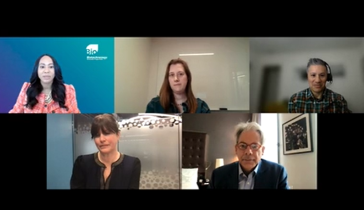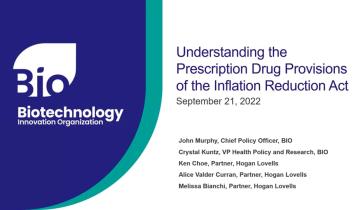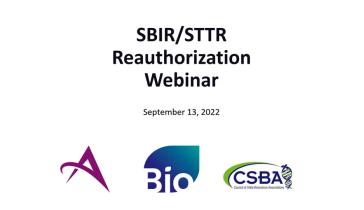September 7, 2023
Speakers: Bernard V. Fallon, Mackensie Vernetti
The BIO Investor Forum is back! Join us at the Hilton San Francisco Union Square from October 17-18 for two days of thought-leadership, partnering, and insight into investment trends and the priorities of venture-stage growth and emerging public biotech companies.
Attend this…

September 13, 2023
Speakers: Phyllis Arthur, John Billington, Brian Dziewa, Ryan Morhard, Justin Pine, Bart Van Vooren
Join us for an important webinar for those invested in the broader biotech industry, "Understanding the Business Implications of Global Access and Benefit Sharing Policies." Tailored for members of BIO and a diverse community of stakeholders, this high-level session focuses on…

September 14, 2023
Speakers: Abe Bassan, MS, Peter Pellerito, Gayatri Varma, PhD, James Zanewicz
With the majority of biological studies conducted in academic settings but nearly all innovative new drug clinical trials sponsored by industry, improving translational research success rates for commercialization is critical to bringing new treatments to patients. Surveys of…


It's been one year since the passage of the IRA. The Centers for Medicare & Medicaid Services has moved forward implementing the law's various provisions, including the new Medicare negotiation program and the redesign of the Medicare Part D benefit. Learn the latest developments from our panel of experts, including how the IRA is impacting biopharmaceutical companies today.

The Cell and Gene Therapy (CGT) Science Series is a quarterly seminar series focused on scientific topics related to cell and gene therapy products. The CGT Science Series is intended to foster scientific exchange between the Biotechnology Innovation Organization (BIO), the American Society of Cell & Gene Therapy (ASGCT), and Center for Biologics Evaluation and Research (CBER) review staff on a variety of topics that span the CGT product lifecycle. The seminars are planned as 60-minute virtual webinars featuring a speaker from one of the three organizations. The CGT Science Series will enable a deep dive into a specific technical and/or scientific area. Topics in the series may include but are not limited to, nonclinical, CMC, clinical, or post-market phases of development related to CGT product lifecycle.
Moderator:
– Anne-Virginie Eggimann, Tessera
Opening Remarks:
– Cartier Esham, Chief Scientific Officer, Biotechnology Innovation Organization (BIO)
Speaker:
– Jing Liao, Director, Vector Development and Operations, Alexion Pharmaceuticals

This Biotechnology Innovation Organization (BIO) webinar explains that the days of the one-page marketing slicks are over, as companies and investors now expect brief “Pitch Decks” when engaging in conversations with them. This diverse panel of experts explain how to make an effective pitch to them, so that you can tailor your BIO partnering strategy to achieve a maximum ROI.

During this webinar, panelists discuss strategies for biotechnology companies to manage economic downturns and weakened investor interest in the biotech industry. Our expert panel of industry leaders share their insights and experiences on how to maintain momentum and emerge stronger during periods of economic uncertainty.
This webinar is designed to provide practical advice and actionable strategies that can be implemented immediately. The panel covers the following topics:
• Effective communication and investor relations strategies during economic downturns
• Actions biotechs can take to cut costs without sacrificing innovation and growth
• How to pitch to investors during weakened investor interest periods

U.S. Department of Justice (DOJ) statistics suggest that enforcement will be a top government priority in 2023, including for pharma/life sciences. Warning or untitled letters from the U.S. Food and Drug Administration (FDA) will serve as ammunition for DOJ cases. Statements about product safety will be heavily scrutinized.
Do you know what to watch out for? Has your company trained its employees and marketing agencies on how to appropriately implement the requirements for promotion? What activities require extra vigilance? The prior downturn in enforcement can be linked to the development of a response to COVID-19, which diverted government resources across the board. Now trends suggest the FDA, DOJ, and Office of Inspector General (OIG) will return to active healthcare enforcement in 2023 for violations of the Food Drug and Cosmetic Act (FDCA), False Claims Act and the Anti-Kickback Statute in part attributable to the goal of obtaining additional financial recoveries.
This webinar hosted by the Biotechnology Innovation Organization (BIO) has these learning objectives:
—Understand the current trends for government enforcement
—Dissect the compliance implications of increased enforcement on the industry
—Identify specific cases that are clear examples for company concern
—Isolate the key principles for avoiding violations
ON-DEMAND
COMMUNICATIONS COMPLIANCE COURSES
FOR PROFESSIONAL DEVELOPMENT
Special Discount
Buy 2 course registrations, Get 1 FREE
through May 15, 2023
in honor of this webinar!
The Center for Communication Compliance (CCC) helps biopharmaceutical companies achieve efficient, compliant innovation in a digital world through its proprietary on-demand business solutions in education, technology, and change management.
The CCC eLearning System has set an unmatched standard for confirming regulatory competency through engaging mastery tests and expert education content across more than a dozen course options.
SEE COURSES LIST
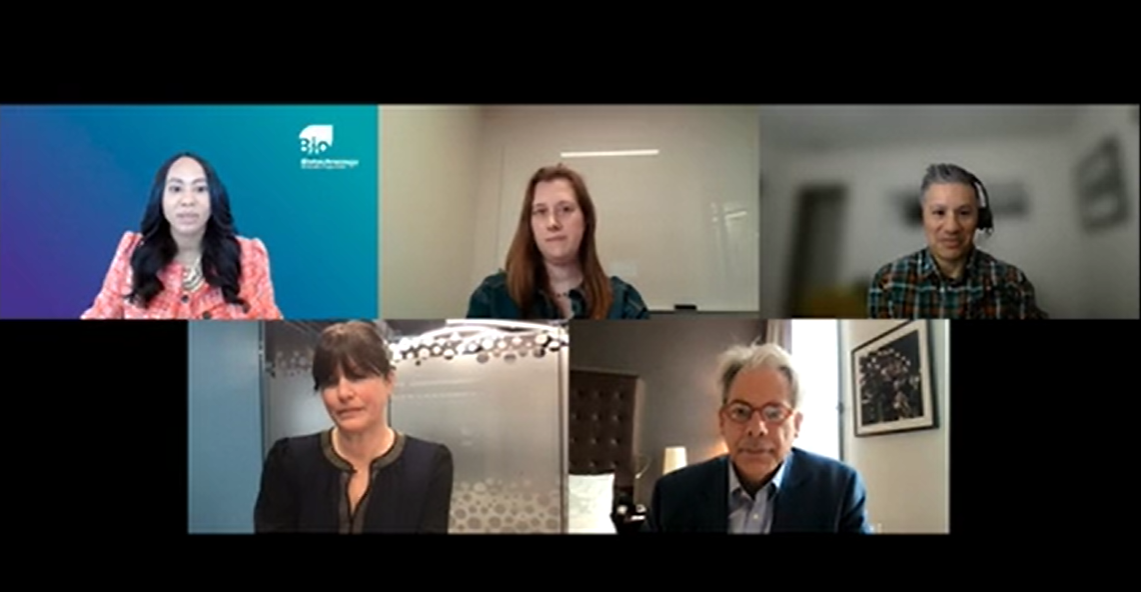
The COVID-19 pandemic has transformed the way we work, and the biotech industry is no exception. As the world recovers, companies are navigating a new landscape of changes in HR, office and lab space, and real estate. To help you understand and prepare for these changes, the Biotechnology Innovation Organization (BIO) convened this webinar, The New Normal: Post-COVID Workforce and Office Trends.
In this webinar, we cover:
--The changing biotech real estate market, rise of innovation districts, and what it means for your company
--How HR policies have evolved in response to the pandemic, including remote work and employee support programs
--Evolving workforce talent demands Changes in office and lab space design to ensure employee safety and productivity

With the majority of biological studies conducted in academic settings but nearly all innovative new drug clinical trials sponsored by industry, improving translational research success rates for commercialization is critical to bringing new treatments to patients. Surveys of academic tech transfer offices and the biopharma industry executives working on such alliances cite as obstacles two highly controllable factors: disagreement about alliance performance metrics and misalignment of deal terms priorities. This panel will foster conversation about best practices for removing such obstacles to accelerate more promising ideas into clinical development for patients.

In 2021, the United States government launched multiple international initiatives focused on issues at the intersection of climate, agriculture, and sustainable food systems. These initiatives are housed under the U.S. Department of Agriculture (USDA) and involve a cross section of government and non-governmental partners.
As part of the 2021 UN Food Systems Summit, the United States launched a Coalition for Sustainable Productivity Growth for Food Security and Resource Conservation (the SPG Coalition) with a goal to accelerate the transition to more sustainable food systems through productivity growth that optimizes agricultural sustainability across social, economic, and environmental dimensions.
Agriculture Innovation Mission for Climate (AIM for Climate/AIM4C) is an initiative launched at COP 26 and led by the United Arab Emirates and the United States. AIM for Climate is focused on addressing climate change and global hunger by increasing investment in, and other support for, climate-smart agriculture and food systems innovation over five years (2021–2025) and enabling greater public-private and cross-sectoral partnerships.
This webinar hosted by the Biotechnology Innovation Organization (BIO) provides an update on the status of the initiatives including a look ahead to COP 27 and beyond. In addition, USDA staff helping to lead this work discuss ways for private sector partners to engage in, support, and amplify the work of the SPG Coalition and AIM for Climate.

On August 16, 2022, President Biden signed the Inflation Reduction Act of 2022, which includes a number of significant prescription drug-related provisions, including a new drug price negotiation program in Medicare, inflation rebates in Medicare Part B and Part D, and a redesign of the Medicare Part D benefit, with a new patient out-of-pocket cap of $2,000.
Leaders from the Biotechnology Innovation Organization (BIO) as well as experts from the Hogan Lovells Life Sciences & Health Care team provide detailed overviews with Q&A on these newly enacted provisions.
The webinar covers the new drug price negotiation program, inflation rebates in Medicare, the Medicare Part D benefit redesign, and new out-of-pocket cap, as well as other important provisions that will reduce patient cost sharing.
- Introduction and Context [0:00:00–0:03:53]:
John Murphy, Chief Policy Officer, BIO - Inflation Reduction Act Background [0:03:54–0:07:26]:
Crystal Kuntz, VP Health Policy and Research, BIO - Drug Price Negotiation Program [0:07:27–0:44:07]:
Ken Choe, Partner, Hogan Lovells - Medicare Part B and Part D Inflation Rebates [0:44:08–1:18:29]:
Alice Valder Curran, Partner, Hogan Lovells - Medicare Part D Redesign [1:18:30–1:53:05]:
Melissa Bianchi, Partner, Hogan Lovells - Conclusion and Next Steps [1:53:06–1:58:02]:
John Murphy, Chief Policy Officer, BIO Downloadable webinar slides at https://bit.ly/BIO-IRA-slides

BIO, CSBA, and AdvaMed hosted a special briefing to discuss the success of SBIR/STTR programs, their economic impact, and the important next steps to Federal reauthorization.
The Small Business Innovation Research (SBIR) and Small Business Technology Transfer (STTR) programs are highly competitive award-based programs that encourage domestic small businesses to engage in Federal Research/Research and Development with the potential for commercialization.
Federal funding for the SBIR/STTR Program will expire on September 30, 2022, and we need your support to ensure timely reauthorization! Hear from successful SBIR/STTR grantees and technical experts on these vital programs. After this webinar, you will be able to effectively advocate for Federal SBIR/STTR program reauthorization.

- Opening Remarks: Overview and Department of Defense Priorities
- Investing at the Speed of Need: Novel Technologies and Platforms to Accelerate Drug Development
The US Government invests in biomedical research in many ways, including direct funding of some critical R&D areas for diagnostics, vaccines, and therapeutics that could strengthen biodefense preparedness. This BIO-hosted webinar details for the biotechnology corporate and academic community the many new and previously available sources of capital, as well as the processes for applying for funding, from the US Department of Defense.
The Department of Defense (DoD) is continuously engaging in efforts to protect the warfighter from a broad array of threats. Preparing for and responding to these threats requires key partnerships with the industry to develop vaccines, therapeutics, and diagnostics that are designed specifically to meet the unique needs of the warfighter in various situations. Many of the investments made through these partnerships also support broader applications of key biotechnologies for other unmet healthcare needs. This important webinar represents an opportunity for BIO members and the whole biotechnology community to get an update about the priorities and programs within the DoD and the ways companies can work with the Agency on their priorities.

- Repurposing and Redirecting: An Alternate Approach to Accelerating Medical Countermeasures
The US Government invests in biomedical research in many ways, including direct funding of some critical R&D areas for diagnostics, vaccines, and therapeutics that could strengthen biodefense preparedness. This BIO-hosted webinar details for the biotechnology corporate and academic community the many new and previously available sources of capital, as well as the processes for applying for funding, from the US Department of Defense.
The Department of Defense (DoD) is continuously engaging in efforts to protect the warfighter from a broad array of threats. Preparing for and responding to these threats requires key partnerships with the industry to develop vaccines, therapeutics, and diagnostics that are designed specifically to meet the unique needs of the warfighter in various situations. Many of the investments made through these partnerships also support broader applications of key biotechnologies for other unmet healthcare needs. This important webinar represents an opportunity for BIO members and the whole biotechnology community to get an update about the priorities and programs within the DoD and the ways companies can work with the Agency on their priorities.

How to Work with the Department of Defense
The US Government invests in biomedical research in many ways, including direct funding of some critical R&D areas for diagnostics, vaccines, and therapeutics that could strengthen biodefense preparedness. This BIO-hosted webinar details for the biotechnology corporate and academic community the many new and previously available sources of capital, as well as the processes for applying for funding, from the US Department of Defense.
The Department of Defense (DoD) is continuously engaging in efforts to protect the warfighter from a broad array of threats. Preparing for and responding to these threats requires key partnerships with the industry to develop vaccines, therapeutics, and diagnostics that are designed specifically to meet the unique needs of the warfighter in various situations. Many of the investments made through these partnerships also support broader applications of key biotechnologies for other unmet healthcare needs. This important webinar represents an opportunity for BIO members and the whole biotechnology community to get an update about the priorities and programs within the DoD and the ways companies can work with the Agency on their priorities.

The Biotechnology Innovation Organization (BIO) presents this webinar to hear from top Big Pharma professionals in search & evaluation licensing and venture investing about what it takes to get them interested in a new technology. We look at their recent deals and ask why they got done, explore the challenges and learn what makes a technology exciting. Then we dive into a discussion on what tech/modalities and platforms are seen as exciting. Finally, we get advice for those biotechs that are ready for licensing or investment.

This Biotechnology Innovation Organization (BIO) webinar explains that the days of the one-page marketing slicks are over, as companies and investors now expect brief “Pitch Decks” when engaging in conversations with them. This diverse panel of experts explain how to make an effective pitch to them, so that you can tailor your BIO partnering strategy to achieve a maximum ROI.

The Biotechnology Innovation Organization (BIO) hosts this candid chat with three major investors from our biotechnology community. Gain valuable insights and be ready to ace pitching world-changing solutions in the face of a down-trending market at the 2022 BIO International Convention, June 13-16, in San Diego, California.
For more details visit http://bio.org/convention
Introduction from Mike Liccardo, VP Corporate Development and CFO, ShareVault





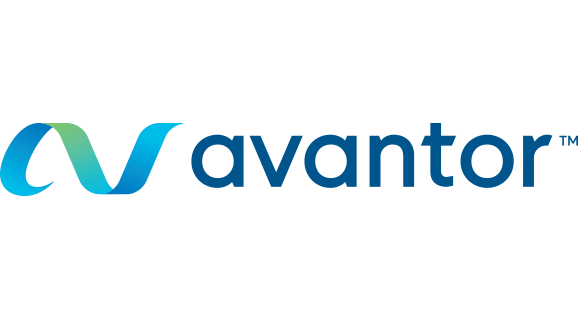

.png)








